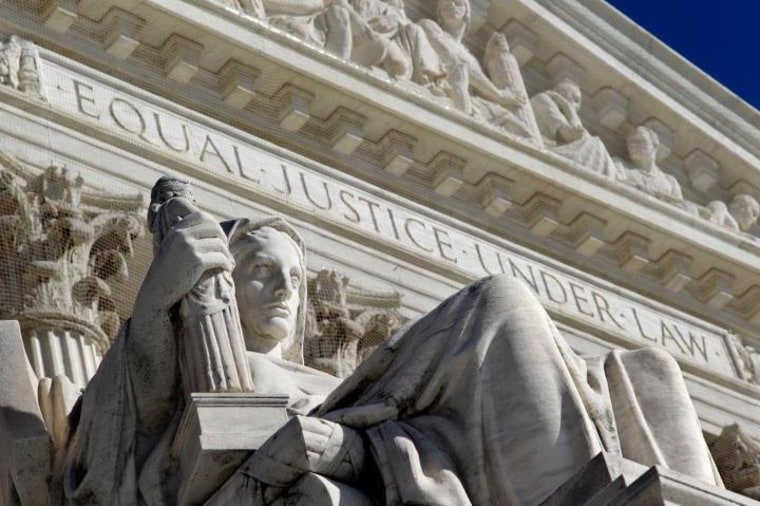Nothing’s decided yet, but a key piece of the Voting Rights Act could be in danger after a day of arguments before the Supreme Court.
“I think it’s a safe prediction to say that the Voting Rights Act, as it now stands, is not going to survive," NBC's Pete Williams reported. "The question is: how far will the Supreme Court go in striking parts of it down?”
Court watchers are making much of a pointed question put by Justice Anthony Kennedy— the crucial swing vote in the case, Shelby County vs. Holder—to the Justice Department attorney defending the law.
If Alabama wants to put up monuments to civil rights heroes in order to “acknowledge the wrongs of its past,” Kennedy asked, “is it better off doing it if it’s its own independent sovereign or if it’s under the trusteeship of the United States government?”
As Lyle Denniston of the respected SCOTUSblog noted, with that phrase—“trusteeship of the U.S. government”—Kennedy appeared to signal his deep skepticism over the provision most at issue, Section 5, which allows the federal government to block even minor election changes made by certain jurisdictions covered under the law, if those changes are deemed to reduce minority voting power. The covered jurisdictions, mostly in the South, are those with a history of racial discrimination.
Conservative opponents of Section 5 argue that by singling out certain states and jurisdictions, the provision violates the Constitution’s guarantee, in the 14th Amendment, of equal protection under the law, and they say times have changed since the 1960s. Voting-rights advocates counter with the 15th Amendment, which authorizes Congress to ensure that voting laws don’t discriminate on the basis of race. They add that evidence shows there’s still racial discrimination in voting, and that the places covered under Section 5 discriminate most.
Kennedy’s comment echoed one he made in a similar 2009 case, in which he declared: “Congress has made a finding that the sovereignty of Georgia is less than the sovereign dignity of Ohio. The sovereignty of Alabama is less than the sovereign dignity of Michigan. And the governments in one are to be trusted less than the governments in the other.” (In that case, the court ultimately steered clear of the constitutional issue.)
That wasn’t the only place where Kennedy may have tipped his hand Wednesday. At one point he said that the Marshall Plan, aimed at rebuilding Germany after World War Two, “was a good thing at one time, but times change.”
But one exchange offered evidence that Kennedy may not be dead-set on striking down Section 5. In questions to Bert Rein, the lawyer for Shelby County, Justices Kagan and Sotomayor essentially argued that even if Congress changed the way it decides which jurisdictions are covered under the law, all of Alabama would almost certainly still be covered. As Denniston notes, Kagan and Sotomayor appeared to be suggesting that the county can’t claim to be harmed by the coverage formula, because it would be covered regardless. And as a result, it has no standing even to bring the case.
Kennedy seemed interested in that argument. “If you would be covered under any formula, why are you injured under this one?” he asked Rein.
If Kennedy does vote to strike down Section 5, it’s almost certainly doomed. The court’s four conservative justices have all in the past signaled that they view it as unconstitutional, and they did nothing Wednesday to suggest those views have changed.
Chief Justice John Roberts asked a question that suggested he opposes efforts to single out certain parts of the country: "Is it the government’s submission that citizens in the South are more racist than citizens not in the South?”
And Justice Antonin Scalia went further, describing Congress’s repeated overwhelming reauthorization of the Voting Rights Act, most recently in 2006, as a “perpetuation of racial entitlement.”
Justice Sotomayor responded by asking Rein whether he agreed with Scalia. “Do you think think Section 5 was voted for because it was a racial entitlement?” she asked. Rein did not answer directly.
Voting-rights advocates may also be taking heart from the example of the Affordable Care Act. The government lawyer arguing the case, Solicitor General Donald Verrilli was deemed to have “choked” during oral arguments, and many court watchers predicted that the law would be struck down. But the court ultimately upheld it 5-4, with Justice John Roberts unexpectedly voting in favor.
The government’s lawyer today: Donald Verrilli.
